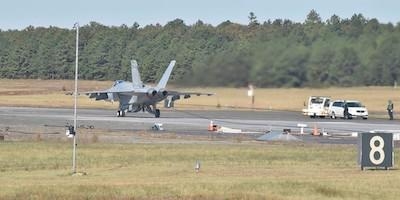Fri, Jan 10, 2020
Part Of The Verification And Validation Of AAG System Requirements
General Atomics Electromagnetic Systems (GA-EMS) announced that High Cycle Testing of its Advanced Arresting Gear (AAG) system for Ford-class aircraft carriers was successfully completed over a two-day period in October 2019 at the Runway Arrested Landing Site (RALS) in Lakehurst, New Jersey. High Cycle Testing was conducted at RALS on a single AAG system that is identical to the three systems aboard the USS Gerald R. Ford (CVN 78). Five F/A-18E/F Super Hornets were involved in the testing to simulate the operational tempo of carrier flight operations at sea.

“Over and over again, in rapid succession, AAG sustained an aircraft arrestment rate of nearly one per minute, successfully testing the system’s capability to handle the recovery sequence required for combat readiness,” stated Scott Forney, president of GA-EMS. “Arresting aircraft at a high rate over a sustained period on the same wire is an aggressive test and shows the ability of the system to withstand extreme conditions. The Ford has the capability for an even higher operational tempo than demonstrated at the test site because it has three wires and clears aircraft from the flight path more efficiently.”
High cycle testing is part of the verification and validation of AAG System requirements. The AAG system test program has completed more than 5,000 arrestments at the land-based test facilities at Joint Base McGuire-Dix-Lakehurst, New Jersey, and 747 arrestments aboard CVN 78 during the ship’s initial sea trials. The Navy has also issued an Aircraft Recovery Bulletin for the fleet air wing, clearing the AAG system for use on all Ford-class carriers.
“We look forward to CVN 78 getting back out to sea in early 2020 to conduct more robust flight operations,” continued Forney. “We anticipate executing significantly more sorties during this phase, utilizing both jet and prop aircraft. AAG works as intended, and we will continue to collaborate with the Navy to ensure system readiness and reliability to meet operational objectives.”
AAG is a turbo-electric system designed for controlled and reliable deceleration of aircraft. AAG is installed on board Gerald R. Ford (CVN 78) along with the GA-EMS Electromagnetic Aircraft Launch System (EMALS), which uses electromagnetic technology to launch aircraft from the deck of naval aircraft carriers. In addition to CVN 78, EMALS and AAG are being delivered for the future John F. Kennedy (CVN 79) and the Enterprise (CVN 80).
(Image provided with General Atomics news release)
More News
Ultrahigh Frequency (UHF) The frequency band between 300 and 3,000 MHz. The bank of radio frequencies used for military air/ground voice communications. In some instances this may >[...]
During The 7 Second Descent, There Was Another TAWS Alert At Which Time The Engine Remained At Full Power On October 24, 2025 at 2115 mountain daylight time, a Cirrus SR22T, N740TS>[...]
From 2009 (YouTube Edition): Educational Organization Aims to Inspire by Sharing Tuskegee Story Founding leader Don Hinz summarized the Red Tail Project’s mission in simple, >[...]
“This feels like an important step since space travel for people with disabilities is still in its very early days... I’m so thankful and hope it inspires a change in m>[...]
Also: New Katanas, Kern County FD Training, IndiGo’s Botched Roster, MGen. Leavitt Named ERAU Dean The Australian Transportation Safety Bureau (ATSB) has wrapped up its inves>[...]
 ANN's Daily Aero-Term (12.19.25): Ultrahigh Frequency (UHF)
ANN's Daily Aero-Term (12.19.25): Ultrahigh Frequency (UHF) NTSB Prelim: Cirrus Design Corp SR22T
NTSB Prelim: Cirrus Design Corp SR22T Classic Aero-TV: The Red Tail Project--Carrying the Torch of the Tuskegee Airmen
Classic Aero-TV: The Red Tail Project--Carrying the Torch of the Tuskegee Airmen Aero-News: Quote of the Day (12.19.25)
Aero-News: Quote of the Day (12.19.25) Airborne 12.17.25: Skydiver Hooks Tail, Cooper Rotax Mount, NTSB v NDAA
Airborne 12.17.25: Skydiver Hooks Tail, Cooper Rotax Mount, NTSB v NDAA



